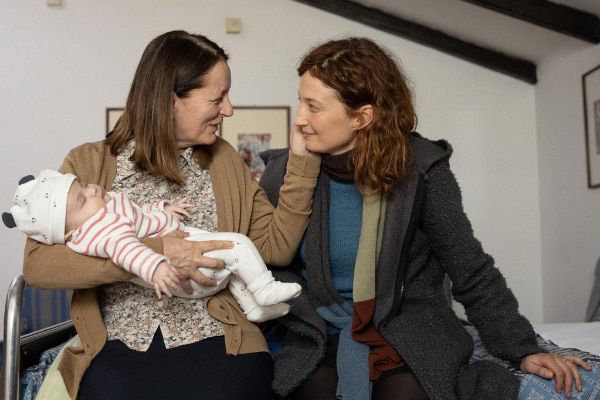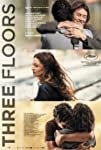Eye For Film >> Movies >> Three Floors (2021) Film Review
Three Floors
Reviewed by: Andrew Robertson

An adaptation of a novel, Three Floors takes its name from its central location, a condominium in an upper-middle-class part of Rome. That by my count, with the garden flat and the balcony, the building might have four is neither here nor there. This is an overly constructed melodrama, feeling like a bourgeois soap opera.
That's not necessarily a bad thing, indeed if pressed I'd probably put much of the work of Pedro Almodóvar in that clumsy bucket. There's a different degree of outrageousness in his work, however, something I cannot quite quantify that might be in tone or colour or pace. There are, within this piece, Parallel Mothers, if you'll allow, but where that works this, well, doesn't.
It starts boldly. The ludicrously lofty lobby of the building is perhaps three storeys tall, and after the credits roll across it that prodigious portico opens to reveal a pregnant woman. As she tries to phone a taxi her labours are rewarded by an oncoming car, one whose course and speed takes it fatally into intersection with another on the crossing before smashing through a ground floor glass brick wall.
This is how we meet them. There are four families across those three or so floors, interconnected beyond their proximity. Upstairs and across hallways, their relationships are the engine of the episodes. Three sections, separated by five years, give us a span that could be sweeping but feels stretched thin.
Eschkol Nevo's novel is adapted by director Nanni Moretti and co-writers Federica Pontremoli and Valia Santella. Nevo's had several works adapted for the screen. Three Floors Up, the source, is set in Tel Aviv. Though its actual title is Shalosh Qomot ('three stories'), which potentially works better as a pun. Its relocation to Rome is not without incident, and while the film has several within it there's something off about its mixture.
Moretti directed documentary Santiago, Italia, but may be best known for 2001's The Son's Room. This is similarly maudlin in places, indeed it even has an empty room where a son had stayed. The mechanism of separation is different, but the repercussions are perhaps as lasting. Pontremoli has collaborated with Moretti on a few occasions, as has Santella. This is apparently the first time that Moretti's adapted someone else's work, his previous forays have included various degrees of autobiography and it may be that there's an issue with its lack. Tel Aviv is a very different place to Prati, though both have history that reaches back millennia.
The ten years and change that the film covers do modify some appearances, but this is mostly in the replacement of the children. There's some haircuts and clothing changes, one new beard, with varying degrees of profundity. Alba Rohrwacher (Monica, 'the widow') and Riccardo Scamarcio (Lucio) have perhaps the most across the decade, but if their struggles had aged them it's more subtle than anything I've experienced.
Less subtle are the events, starting with that pedestrian struck by a vehicle in a way whose immediacy and finality are almost comic. There are some starker moments. Rohrwacher's fey qualities find a match in a massive corvid that haunts her, but it's one note in an assemblage that never quite gels. The stories might notionally pull together but these feel like a pile of sticks rather than a cohesive nest, a jigsaw that's middling and without edge.
There's bits of darkness to it, parental fear and failing among them, but those have little to contrast. There are places where it is maudlin, even lachrymose, but even with a tally of births, deaths, trials, even a dancing flashmob, I felt it less eventful than a punctuated tedium. Though we're given dates, and so can place the whole, it doesn't so much feel timeless as unending. A marimba credit is delightfully old-fashioned, but the rest of the film is not.
I wonder if it wanted for a different structure, to revisit its revisitations, to give us scenes from different perspectives. There are points where it perhaps gives us grounds to recontextualise things we've seen before. They are rare, however, and they more have the air of relief than revelation. It may be that two hours wasn't enough, that works out at about 2 seconds a day. It would be unkind to say that it feels like the reverse, but time can play tricks on you. Apparently it received an 11 minute ovation at Cannes, which doubtless means it has an audience. I doubt it was wholly in relief that it had finished. It was for me.
Reviewed on: 08 Mar 2022
















